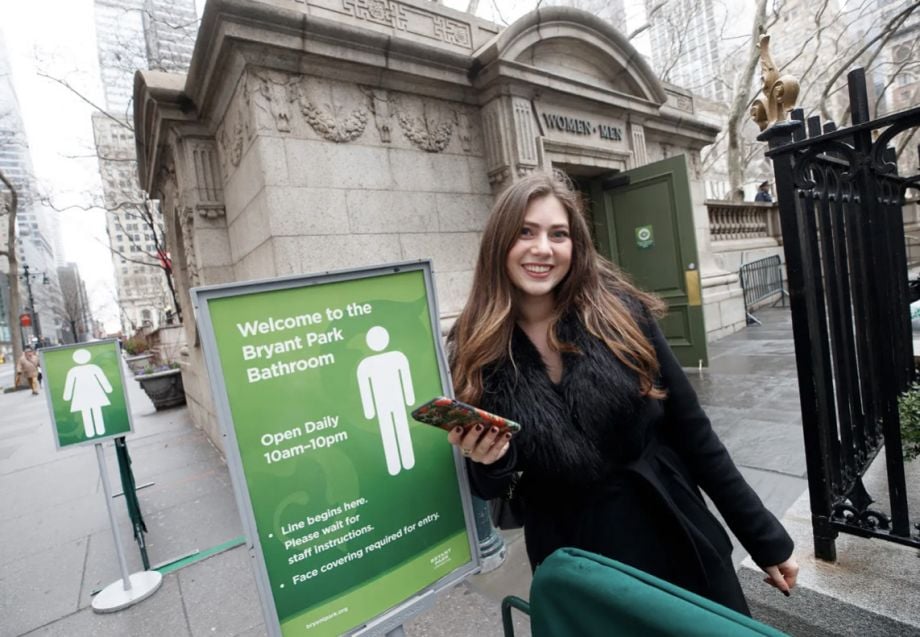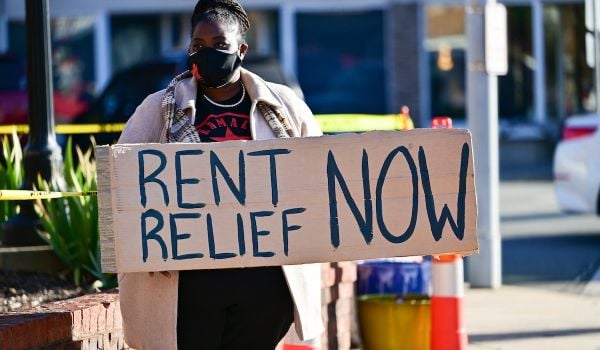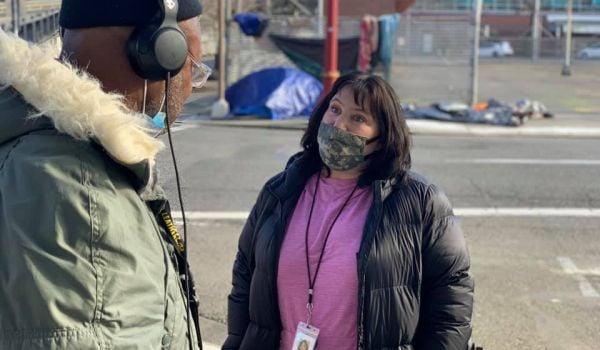A public bathroom crisis is mounting around the U.S. as cities struggle with how to meet a basic human need. And while cities are exploring options to help solve the crisis, older adults, unhoused people, transgender people, people with disabilities and families with small children are bearing the cost.
Enter got2gonyc, a source for all things bathroom in New York City and the brainchild of 24-year-old opera singer Teddy Siegel.
She’s turned a part-time project documenting bathrooms around New York City into a full-time mission to increase bathroom access and equity around New York City’s five boroughs — and ultimately the world. Her porcelain empire includes a crowd-sourced bathroom map that’s become Google’s largest and most-used map, over 350,000 Instagram followers and advocacy for multiple bathroom bills to make finding a bathroom easier for everyone.
Such mapmaking is a form of guerilla activism — exposing how the government has failed to meet a basic human need and stepping in to fill the gap.
Could other citizens start their own grassroots advocacy, creating maps of essential resources for people in their cities? Siegel encourages other would-be changemakers to embrace the quirky side of advocacy.
“I think that if anyone has any idea, even if it may seem kind of quirky, silly or flippant, just to — there may be something real there and to really stick to it and follow through,” she says.
How it started
Siegel’s social media star is on the rise, with an editorial in the New York Times, an appearance on The Kelly Clarkson Show and swag hauls from Charmin and Preparation H. But it all started with something most people can relate to: desperately wandering the streets looking for a restroom.
“I always say that everything with this all really just happened by accident,” says Siegel.
While shopping with her sister in Times Square, Siegel found herself searching high and low for a place to answer nature’s call. After being turned away by several businesses, she finally made it to McDonald’s, where an employee told her that she needed to buy something first.
Frustrated by her experience, she made a TikTok about where to find a free bathroom in Times Square.
“By the next day, it had around 10,000 views and people had started submitting different bathroom locations in my comment section and also in DMs.”
Now, she says that Instagram is her most popular platform. Not only does she rate bathrooms around New York City — down to the texture and quality of the toilet paper — she also advocates for bathrooms as a basic human right. People from delivery drivers to unhoused people to tourists have used her bathroom map to find a safe place to go.
Siegel has even achieved a rare degree of fame in anonymous New York City: People are starting to recognize her in public from her Instagram and TikTok content.
“So many people on the street will be like, ‘Oh my gosh, you’re a hero, you’ve saved me so many times.’”
Crowd-sourcing a public bathroom map
Siegel’s bathroom map has over 3,700 locations across the world and 20,000 editors. Anyone can add a bathroom or update information for accessing it, like the bathroom code.
There have been some technical issues that Google is still working to resolve.
“I always tell everyone, you just have to keep clicking the link. It may take you 30 tries, but eventually it will open.”
Bathroom advocacy isn’t all coffee poop jokes and “Come pee with me” videos . According to a study from 2021, New York City has only four public bathrooms for every 100,000 people. Predictably, visitors and residents pay the price — especially people from marginalized groups.
Siegel credits her audience for sharing their bathroom stories with her and exposing the darker side of bathroom inequity.
In candid on-the-street interviews that Siegel shares on Instagram and TikTok, New York City residents and visitors tell stories about peeing between cars on the street, purchasing an Equinox membership just to have access to a bathroom and being ticketed for public urination.
“I have never — except for one time — been turned away from a bathroom,” says Siegel. “And I know that’s just not the reality of other people in New York City and throughout the country.”
Siegel has collected over 25 bathroom stories (many from anonymous New Yorkers) on her website that describe the humiliation and frustration of searching for a bathroom and being repeatedly denied, especially as a person with a medical condition like IBS or endometriosis.
In her comments and messages, Siegel says that anti-homelessness is a common reaction — people who oppose making bathrooms more accessible for the simple reason that unhoused people might use them.
“Those comments make me so angry and so upset… bathrooms are the most sacred and safe and private spaces, yet they are used to not only exclude but erase people from society.”
So far, Siegel has helped push four different bathroom bills in the New York City Council, including a bill to identify new locations for public bathrooms:
-
Intro 258 (passed October 2022): Requires the city to report back on potential locations for public bathrooms in every ZIP code in the five boroughs.
-
Intro 576 (passed November 2023): Requires the city to inspect and report on the condition of public bathrooms that already exist and post this information online.
-
Intro 267 (in committee): Would open bathrooms in municipal buildings to the public during business hours and require the city to post the location of these bathrooms online.
-
Intro 272 (in committee): Would require the city to develop a plan to build bathrooms in every ZIP code in the five boroughs.
Right now, Siegel is most excited about a proposal to open bathrooms in municipal buildings to the public.
“Our tax money is going there so we might as well have access to those bathrooms that we’re paying for.”
She points out that public bathrooms as infrastructure are expensive to build and maintain, but other countries have pursued creative solutions to an age-old problem by utilizing existing bathrooms to meet the need. For example, London offers tax breaks for businesses that open their bathrooms to the public. Germany offers a similar program, Nette Toilette (“nice toilet”) that pays businesses a monthly fee.
Despite the ugly side of bathroom inequality, Siegel makes it a point to bring humor and lightness to her content. So far, she’s ruling out a career in public service, but not ruling out one day writing an opera about bathrooms — or producing a run of “Urinetown: The Musical.” It’s all storytelling, after all, whether she’s singing or dancing in bathrooms across the city or speaking at a press conference for a bathroom bill.
“I really am so proud that I’ve built a community of people where everyone is welcome, everyone is included, and everyone can come and just feel safe and share their stories.”
This story was produced through our Equitable Cities Fellowship for Social Impact Design, which is made possible with funding from the National Endowment for the Arts.

Maylin Tu is Next City's Equitable Cities Reporting Fellow for Social Impact Design. A freelance reporter based in Los Angeles, she writes about transportation and public infrastructure (especially bus shelters and bathrooms), with bylines in the Guardian, KCET, Next City, LAist, LA Public Press and JoySauce. She graduated with a BA in English from William Jewell College in Missouri.
Follow Maylin .(JavaScript must be enabled to view this email address)
















Add to the Discussion
Next City sustaining members can comment on our stories. Keep the discussion going! Join our community of engaged members by donating today.
Already a sustaining member? Login here.